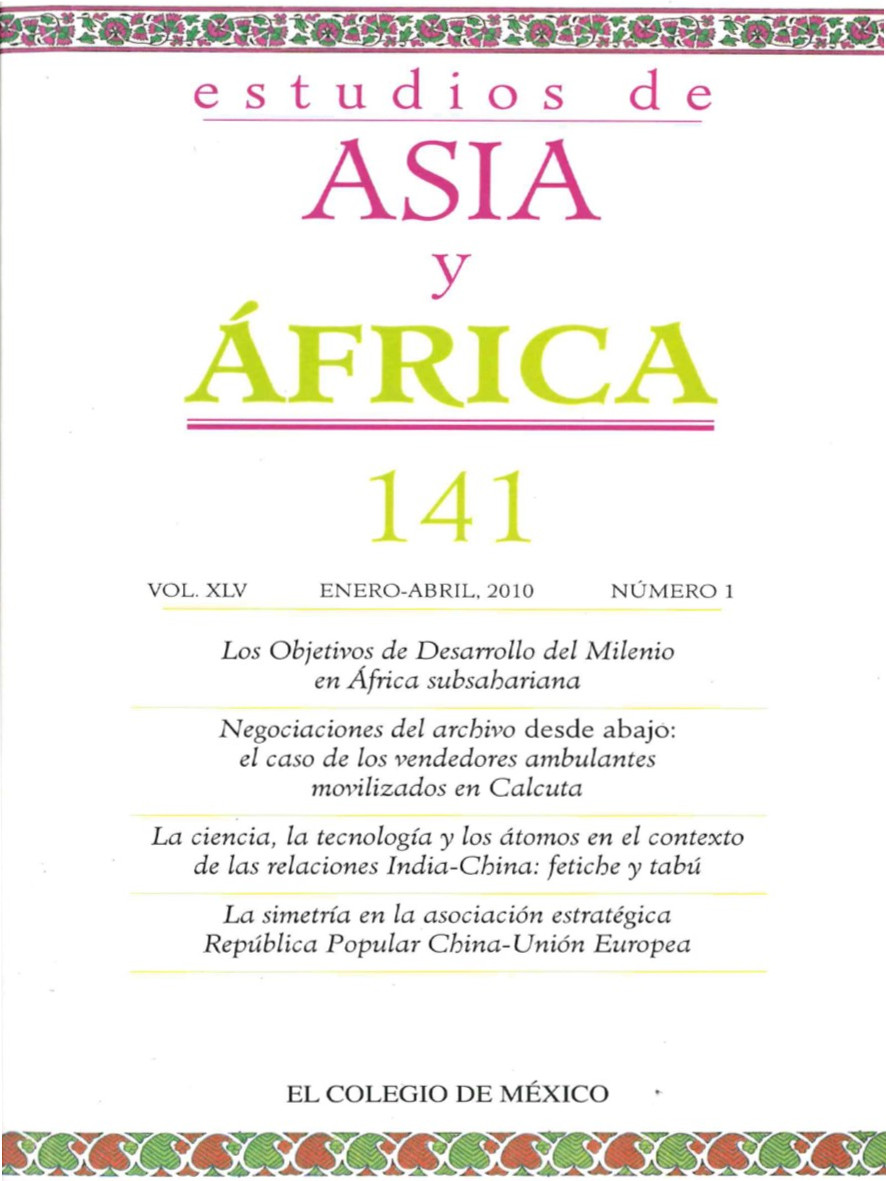Resumen
La genealogía del desarrollo de la ciencia y la tecnología en India y China, y su conceptualización como mecanismos de incubación de conocimiento secular, progreso y desarrollo nacional evidencian la forma singular de caracterizar a la ciencia occidental, particularmente a la energía nuclear, como la máxima expresión de la modernidad. Este ensayo pretende mostrar el proceso mediante el cual la ciencia y la tecnología fueron percibidas en India y China a principios del siglo XX. El propósito es revelar los mecanismos acríticos en que se reprodujo la colonialidad de los saberes, a través de la creación de instituciones científicas y educativas a la europea, que dieron lugar a una geopolítica del conocimiento: excluyente y degradante de los saberes anteriores a la experiencia colonial. Con el proceso de autodeterminación de India y el fin de la experiencia colonial europea en China, las instituciones científicas y educativas así establecidas fueron identificadas por las elites locales como herramientas aceleradoras del “progreso” y del desarrollo nacional, y por ende, como coadyuvantes en la proximidad a la “modernidad” del discurso europeo.
Referencias
Abraham, Itty, The Making of the Indian Atomic Bomb. Science, Secrecy and the Postcolonial State, Londres, Zed Books, 1998.
Anderson, Robert S., Building Scientific Institutions in India. Saha and Bhabha, Montreal, Centre for Developing-Area Studies, McGill University, 1975.
Arsovska, Liljana, “Introducción”, en Ailing Zhang, Amor en la ciudad en ruinas, México, El Colegio de México, 2007, pp. 9-21.
Banerjee, Ishita, Saurabh Dube y Walter D. Mignolo (coords.), Modernidades coloniales, México, El Colegio de México, 2004.
____________, “Reading time: texts and pasts in colonial Eastern India”, Studies in History, vol. 19, núm. 1, 2003, pp. 1-17.
Beijing Review, vol. 41, núms. 21, 22, 25 y 32, 1998.
Camilleri, Jospeh A., The State and Nuclear Power. Conflict and Control in the Western World, Sussex, Harvester Press Group, 1984.
Castro-Gómez, Santiago, “Latinoamericanismo, modernidad, globalización. Prolegómenos a una crítica poscolonial de la razón”, en Eduardo Mendieta y Santiago Castro-Gómez (eds.), Teorías sin disciplina (latinoamericanismo, poscolonialidad y globalizaciónen debate), México, Miguel Ángel Porrúa. [http://www.ensayistas.org/critica/teoria/castro/].
Chatterjee, Partha, The Nation and its Fragments. Colonial and Postcolonial Histories, Princeton, Princeton University Press, 1993.
Chen, Joseph T., “The May Fourth Movement redefined”, Modern Asia Studies, vol. 4, núm. 1, 1970, pp. 63-81.
Chow Tse-tsung, The May Fourth Movement, Stanford, Stanford University Press, 1967.
Deng Xiaoping, “Emancipate the mind, seek truth from the facts and unite as one in looking to the future”, diciembre 13, 1978.
____________, “Uphold the four cardinal principles”, marzo 30, 1979.
____________, “The present situation and the tasks before us”, enero 16, 1980.
Duara, Prasenjit (ed.), Decolonization. Perspectives from Now and Then, Londres, Routledge, 2004.
Evans, Harriet, Historia de China desde 1800, México, El Colegio de México, 1989.
Garver, John W., “The restoration of Sino-Indian comity following India’s nuclear tests”, The China Quarterly, núm. 168, diciembre de 2001, pp. 865-889.
Hansen, Thomas, The Saffron Wave. Democracy and Hindu Nationalism in Modern India, Princeton, Princeton University Press, 1999.
Hu Guangyao y Hu Xiaoming, “Nuclear tests threaten stability”, Beijing Review, vol. 41, núm. 22, junio 1-7, 1998, p. 7.
Jain, J. P., Nuclear India, Nueva Delhi, Radiant Publishers, vol. 2, 1974.
Jerath, Arati R., “Government flashes China card at the West”, The Indian Express, mayo 14, 1998.
Kumar, Deepak, “Reconstructing India: disunity in the science and technology for development discourse, 1900-1947”, Osiris, 2a. serie, vol. 15: Nature and Empire and the Colonial Enterprise, 2000, pp. 241-257.
Kwok, D. W. Y., Scientism in Chinese thought, 1900-1950, New Haven, Yale University Press, 1965.
Locke, John, Some thoughts concerning education, Nueva York, J. W. Schermerhorn, 1869.
Lok, Sabha, Lok Sabha Debates, sexta session, vol. 5.
Mao Tse-tung, Obras escogidas de Mao Tse-tung, vol. i, Pekín, Ediciones en Lenguas Extranjeras, 1968.
Mao Zedong, “Sixty points on working methods. A draft resolution from the Office of the Centre of the cpc, February 2, 1958”, Selected Works, 2008 [En línea].
Mehta, Uday, Liberalism and Empire: A Study in Nineteenth-Century British Liberal Thought, Chicago, University of Chicago Press, 1999.
Ministerio de Relaciones Exteriores de China, “China’s statement on India’s nuclear tests”, Beijing Review, vol. 41, núm. 22, junio 1-7, 1998, p. 7.
Needham, Joseph, Science and Civilisation in China, vol. 2, Cambridge, Cambridge University Press, 1991.
Nehru, Jawaharlal, Selected Works of Jawaharlal Nehru, vols. 1, 4 y 5, Nueva Delhi, Jawaharlal Nehru Memorial Fund, 1987.
Oficina de Información del Consejo de Estado de la República Popular China, Defensa nacional de China en el 2002, Beijing, Nueva Estrella, 2002.
____________, “Defensa nacional de China”, en Beijing Review, vol. 41, núm. 32, agosto 10-16, 1998.
Ram, N., Riding the Nuclear Tiger, Delhi, LeftWord Books, 2001.
Savarkar, Vinayak, Hindutva. Who is a Hindu?, Nueva Delhi, Bharati Sahitya Sadan, 1969.
Swami, Praveen, “Ahawkish line on China”, Frontline, vol. 15, núm. 11, mayo 23-junio 5, 1998. [En línea] http://www.flonnet.com/fl1511/15111050.htm [Consultado: 3 de septiembre de 1999].
Swamy, Subramanian, “Vajpayee’s China fiasco”, Frontline, vol. 15, núm. 22, octubre 24-noviembre 6, 1998 [En línea] http://www.hinduonnet.com/fline/fl1522/15220430.htm [Consultado el 3 de septiembre de 1999].
Perkovich, George, “What makes the Indian bomb tick?”, en D. R. Sardesai, Nuclear India in the Twenty-first Century, Nueva York, Palgrave, 2002a.
____________, India’s Nuclear Bomb, Berkeley, University of California Press, 1999b.
Teng, Ssu-yu y John Fairbank, China’s response to the West, Nueva York, Atheneum, 1963.
The Times of India, “Now, George says China is ‘potential threat no. 1”, The Times of India, marzo 13, 1998.
Wallerstein, Immanuel, Universalismo europeo. El discurso del poder, México, Siglo XXI, 2007.
____________, El moderno sistema mundial III. La segunda era de gran expansión de la economía-mundo capitalista, 1730-1850, México, Siglo XXI, 1998.
Wang Gungwu, “May Fourth and the GPCR: The Cultural Revolution remedy”, Pacific Affairs, vol. 52, núm. 4, invierno, 1979-1980, pp. 683-684.
Yuan Jing-dong, “India’s rise after Pokhran II: Chinese analysis and assessments”, Asian Survey, vol. XLI, núm. 6, noviembre-diciembre, 2001, pp. 978-1002.
Esta obra está bajo una licencia internacional Creative Commons Atribución-NoComercial-SinDerivadas 4.0.
Derechos de autor 2022 Estudios de Asia y África


